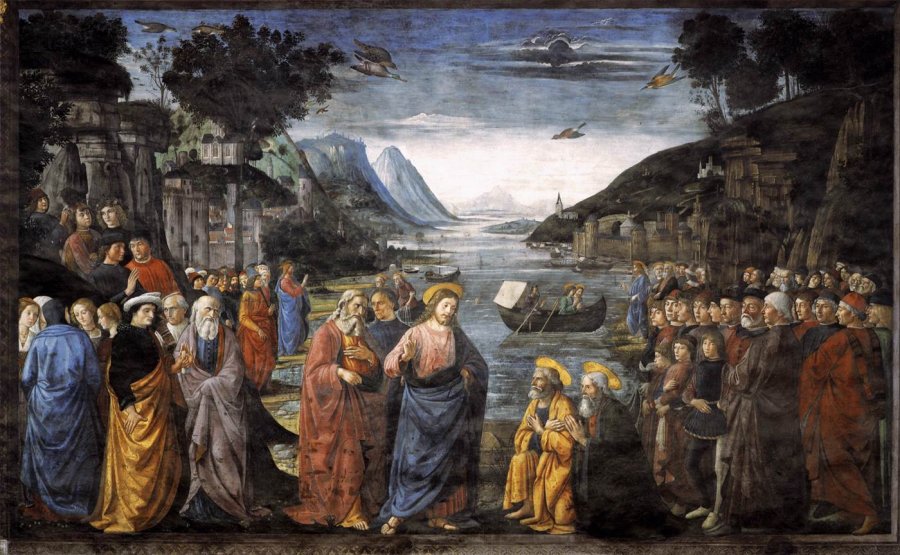“The time is fulfilled, and the kingdom of God has come near; repent, and believe in the good news.” [Mark 1:15, NRSV]
 The Calling of Peter and Andrew, by Domenico Ghirlandaio 1449-1494
The Calling of Peter and Andrew, by Domenico Ghirlandaio 1449-1494
The urgent and fundamental concerns of Jesus of Nazareth are summed up in his proclamation: “The kingdom of God is close at hand, repent and believe in the good news” (Mark 1:15).
The Gospels point to Jesus’ vision that the arrival of the kingdom signifies that the day has come, that it is already here, that God engages people with a power never before witnessed by human beings. In Jesus’ view, this fuller presence of God demands a dedicated response of commitment to Jesus and of walking the way of discipleship, so that people may live under the reign of God.
One of the principal sources of Jesus’ vision of the reign of God was his personal experience of God and the vocational-calling which flowed from that experience, as we saw above. Jesus experienced his call to mission within his human, social and concrete context, his concrete historicity. Jesus recognized well the struggles of Israel. His own human life, together with his human freedom and potential for mediating life and love, were enmeshed in the struggles of the very people to whom he belonged. Israel was far from being a nation of one people, one covenant.
- Israel, though chosen, was so often unfaithful. Internally, Israel lived a segregated life, with the rich segregated from the poor, the clean from the unclean, the healthy from the sick and so on. Jesus saw all this as ungodly. Convinced that God most certainly wished to transform this society and the people within it, he also knew that he was called to mediate that transformation. His profound experience of God would offer light and energy for God’s decisive and salvific action in this world.
- Externally, Israel was under Roman control. But Israel has long held the conviction that the kingdom of God was coming. The kingdom that Israel has for centuries longed for, would be a kingdom of “universal justice, love and peace” which would embrace Israel itself and reach out from it to every other nation. This kingdom would feature a four-fold peace: peace within individuals, peace with one’s neighbour, peace between nations, and peace with all of creation. Developed over time, Israel’s conviction of the advent of the kingdom of God has its root on Nathan’s prophecy to David (2 Samuel 7:11-16) that the Davidic dynasty would be preserved.
- Jesus well knew the differences of theories and efforts within Israel about how it could bring about God’s reign. His own proclamation of the presence of God’s reign did not go down well within Israel without causing controversy and contradiction. The Babylonian exile and the several centuries after it, have left the Israelite people in a quandary over when and how God would establish His reign. Diverse ideologies in this regard were fostered within Israel: The Pharisees insisted on Torah-faithfulness; The Zealots wanted a revolutionary overthrow of Roman rule; The Essenes put confidence in a life of asceticism; The Sadducces (aristocrats, chief priests, elders) anchored for God’s blessings through collaboration with the Romans.
In terms of the four-fold peace, all human paths led to failure, relying as they did on the native abilities of human beings to fashion that peace. Jesus was clear that it was precisely these all-too-human abilities, marked by human weakness, human sinfulness, and the forces of evil, that resisted the ideal of the kingdom and impeded its realization. Israel believed that what God promised could not be achieved by mere human effort. Israel needed God’s power, a transcendent power for justice, love and peace. Jesus came onto the scene to call attention to the fact that this kingdom of God was close at hand. It was truly God’s initiative, God’s intervention in human history.
And yet, this divine initiative has got to be communicated, brought near and manifested by a true human. A human person must show humanity that the good news and the evangelical values that Jesus preached were indeed achievable. Jesus knew that he was charged with that mission and, to fulfill it, he must live a beautiful and noble life, to reflect the image of God, till death. In all this, Jesus knew well that the rules of heaven could not just reside in heaven; they have got to reside in the human hearts, if they were to reside on earth at all. He saw it as his calling to declare to the people that the reign of God was with them, here and now, and that they, the human beneficiaries, need to want it, accept it, and respond to it with commitment and fidelity. So the Gospels enunciate by stories that the Jesus of Nazareth was the human agent who brought the kingdom of God to light, emphasized its truth by performing that truth in words and deeds, through a radical living from start to finish. He loved to the death, in peace and non-violence. He saved us, not by some magical formula, including “dying for us and rising from the dead”, but by showing us the way of the kingdom to which we must adhere as the sure path to eternal happiness with God.
Copyright © Dr. Jeffrey & Angie Goh, June 2018. All rights reserved.
You are most welcome to respond to this post. Email your comments to jeffangiegoh@gmail.com. You can also be dialogue partners in this Ephphatha Coffee-Corner Ministry by sending us questions for discussion.
